Question: We adopted our daughter 8 years ago. We have an open relationship with her birth mom, Jane, and visit a couple of times a year. Birth dad is out of the picture.
Jane got married a couple of years ago to a great guy, and their life is very settled. Joe loves kids, including our daughter, and we knew it was only a matter of time before they wanted to start a family.
Jane just told us she is pregnant, due in the fall. We are meeting up with her next month for a semi annual visit. We are all so excited!
Our daughter has, in the past, desperately wanted a sibling, and we’ve talked about that in the hypothetical. About how she would have a relationship with any other children her birth mom may have much like she has with her cousins who live across the country — they love each other dearly, they just don’t get to see each other as often as we’d like.
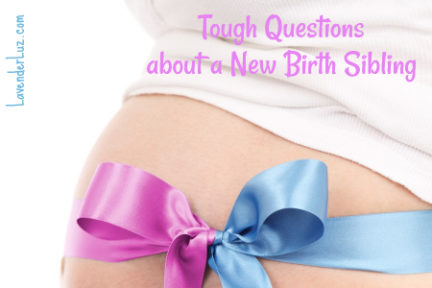
We are trying to anticipate the questions our daughter may have about a new sibling. We want to make sure that we answer as sensitively as possible. Some of the tougher ones that have crossed our minds are these:
- Will this child will come to live with us? (And why not?)
- Will our daughter go to live with her birth mother? (And why not?)
Any advice would be greatly appreciated.
— Brooke
Been There Done That (Birth Mom’s Side)
Guest responding is my friend Ashley Mitchell. Ashley is a mother of two and a birth mother of one. She is learning daily how to navigate open adoption and how to create a lifetime of healing and forward movement post placement. She is founder of both LifetimeHealingAdoption.com and BigToughGirl.com.
~~~~~
 Hi, Brooke, and thank you for your question!
Hi, Brooke, and thank you for your question!
It is always such an exciting thing when we are able to watch birth mothers step into a space of healing, find love and move forward into starting a new family. The first pregnancy after placement can always bring up so much emotion and can be a delicate time for the mother.
I am a birth mother and placed my son for adoption 12 years ago. My husband and I have two children. When my son turned 10 we had our first sleep over. It was an exciting time but we knew that we needed to have some conversations with our children before my son came to stay. Up until that point he had been talked about as “family.” We have an open adoption and the kids had spent a lot of time together but we knew that in this more intimate setting, we needed to allow space for conversation. We talked about how he was in my belly, just like they were, and I was met with a classic response: “We were all in there at the same time?!”
Here is one thing that I have learned: it’s we adults who make things complicated. We have watched the relationships between our children develop and grow in nothing but fun, respect and love. They are family. I know that we have processed through a lot of questions and I know that there will be more to come but for now, we take it one visit at a time and we follow their lead. I have to say that watching my three children together has been the greatest privilege of my life.
Ashley Mitchell, owner of Lifetime Healing, set out to seek increased care, understanding, and resources for birth mothers. For almost a decade, Ashley has been one of the most consistent and sought after birth mother voices in the nation. Well known for her vulnerability and transparency in adoption, her story has touched the hearts of countless members of the adoption community.
My 2 cents (BTDT Adoptive Mom’s side)
Between my two teenagers, there are four first parents who are parenting previous or subsequent children.
I wish to address the specific questions you brought forth, for even if your daughter doesn’t ask, it is possible that she will wonder. Such questions could cause you to brace yourself, just hoping to hold on during the conversation. OR, they could, with attunement (which I can tell from our correspondence you practice) be an opportunity for deepening your relationship with your daughter.
I might say something like this:
Jane’s baby will live with Jane and Joe. They are ready to be parents now, and they have the ingredients they need to be good parents to a new baby. (Pause. Maybe ask how that sounds to your daughter. Maybe brainstorm together what those ingredients are.)
Back when she was pregnant with you, Jane loved you just as much as she loves this baby. The difference isn’t the baby. The difference is the timing. You needed ready parents then, and you got us.
Dear Readers, what advice do you have for Brooke?
See Also:
- “Ask Amy”Got it Right about a Found Sibling: 3 points in favor of reaching out.
- I Know Something I’m Not Supposed to Know About My Child’s Birth Mom: At what point do I tell my son he has a bio sister?
- What Does “Real” Mean? An Adoption Talk with My Daughter: I was prepared to be discounted as a real mom, but it never occurred to me that my children might discount each other.
About this Open Adoption Advice Column
- I am not a therapist. Please do not rely on words in this space to make your own major or minor decisions.
- Readers, please weigh in thoughtfully and respectfully. Remember that this is a teaching endeavor rather than a shaming endeavor. We we aim to bring light rather than heat. People do the best they can with what they have to work with, and our goal is to give folks more to work with.
- Send in your own open adoption question for consideration.
~~~~~
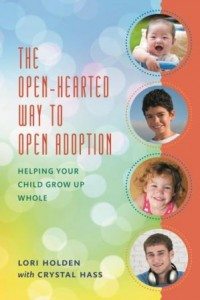 Lori Holden, mom of a teen son and a teen daughter, blogs from Denver. Her book, The Open-Hearted Way to Open Adoption: Helping Your Child Grow Up Whole, is available through your favorite online bookseller and makes a thoughtful anytime gift for the adoptive families in your life.
Lori Holden, mom of a teen son and a teen daughter, blogs from Denver. Her book, The Open-Hearted Way to Open Adoption: Helping Your Child Grow Up Whole, is available through your favorite online bookseller and makes a thoughtful anytime gift for the adoptive families in your life.

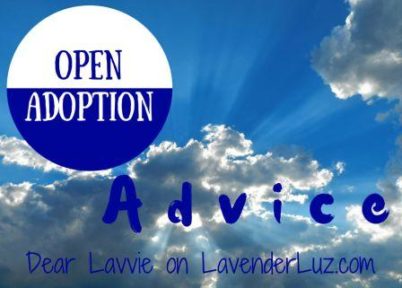
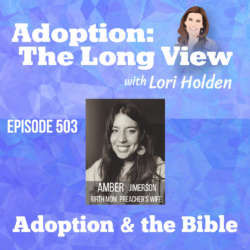
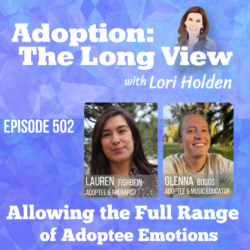
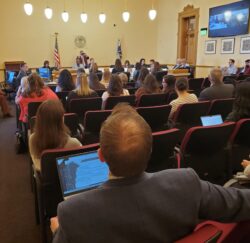
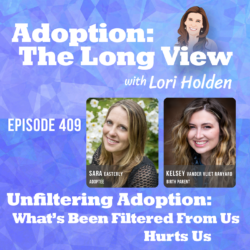

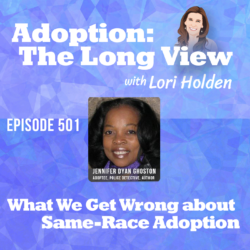

13 Responses
Ashley’s observation about the adults being the ones who usually make things difficult is so true and insightful. It’s something I struggle with in my family. I also like probing with thought exercises, allowing for the conversation to be both organic and ongoing. Lots of wisdom here
I wouldn’t try to distance the relationship to a cousin status (if that was what you were trying to do). Nor would I refer to her sibling as a half-sibling, just a sibling, family is family right? I always knew I probably had siblings as my mother probably married – just thinking I had siblings was important.
I would watch for these two specific core issues just in case not just the new sibling but her age as well.
“Rejection: Feelings of rejection can be felt by some adoptees, as they struggle to make sense of their relinquishment. Regardless of whatever logical explanations they have been given, some can still feel abandoned.”
“Grief: The loss inherent in adoption needs to be recognized and grieved. Parents and others surrounding adopted children often try to downplay the feelings of loss, wanting to spare the child emotional pain. When this is the reaction children receive about their loss and grief, they try to hold it in instead.”
Post-Adoption Services: Acknowledging and Dealing with Loss
https://www.adoptioncouncil.org/files/large/ad07fe3e4ce31cd
I’m so glad you’ve added your advice here, TAO. I find the part on Grief especially helpful. It doesn’t serve our kids when we try to protect them from feeling emotional pain that they already feel.
Wow — I really love this: “The difference isn’t the baby. The difference is the timing. You needed ready parents then, and you got us.” It’s reality AND it’s an explanation that allows for the relationship to keep moving forward and growing.
It does not explain why the eight year old would not return to her birth family now the timing is right for her biological mother to be the only mother for a child. That kind of stuff does happen with foster kids, but adoption is different, that has to be explained too… From which point it might be needed to go into ways the adoption might be turned back by or for her, to show that as an adoptive parent it was not the intention to imprison her with the adoption.
I hear that you feel adoption is prison, Theodore.
You say, “now the timing is right for her biological mother to be the only mother for a child.”
I wonder if your statement splits the baby, too. We really don’t know how this 8 year old would feel about completely negating her experience and ties of the last 8 years. Could it be damaging to do this with one set of parents as the other? And is there a better way, given the situation the letter writer and Jane and the others are in?
I guess you failed to notice this was a reaction to Mel’s “Wow — I really love this: “The difference isn’t the baby. The difference is the timing. You needed ready parents then, and you got us.” It’s reality AND it’s an explanation that allows for the relationship to keep moving forward and growing.”
so I reacted with “It does not explain why the eight year old would not return to her birth family now the timing is right for her biological mother to be the only mother for a child.” as of the original asker’s two questions:
“•Will this child will come to live with us? (And why not?)
•Will our daughter go to live with her birth mother? (And why not?)”
only the first one is sufficiently answered by the timing issue. The baby can stay with their mother, because there is no need for the baby to live somewhere else now. The daughter HAD to go elsewhere because of timing, but now the mother can be mothering one, why not two? Why has she still to live with the adopters, now? It was not my intention to suggest there are no reasons why not, not even that there are no good reasons, so the logical thing thing would be to tell the daughter the truth: These legal and these practical reasons prevent that, but telling about laws can seem not so kind, so the daughter should be told about the rights she has as a result of the adoption, and about the legal ways which are/will be available to her to end the adoption, for a bit of mitigation. I just suggest that the adoptive parents take the time to really learn and understand the reasons for the daughter staying with them, so they can explain them. For the short term, getting two children of different ages at the same time, might be too much work for their mother, and that might endanger the baby, you know: don’t adopt while pregnant, that could lead to child endangerment, but for the longer term, my advice to the adoptive parents would be: Know the reasons very well, so you can explain them, and mitigate them, while being absolutely honest.
Mel and Cristy: thank you. ??
My now-grown children through adoption are the second and third of several siblings, so we had lots of practice with these conversations. What I learned is that no matter how “right” and sensitive our explanations and responses are, it can stir up a lot of pain.
The conversations we have with our kids when they are young may not provide them smooth sailing through family changes. But in my experience they can provide the foundation for an adult appreciation and acceptance later. Of course I don’t know what my kids don’t tell me these days, but we do have a lot of talks about their (and my) complex feelings about our families.
I also learned to appreciate do-overs. One of my kids was about 6 when a sibling was born, and she felt it was imperative that she go live with her birthmother right then. No amount of explanation or reassurance I could come up with assuaged her.
Finally I lost, it, broke down in tears, and said “You can’t go because it would break my heart.” Most of the other excellent reasons why we couldn’t have open contact then were not age-appropriate information, and I don’t think they would have reached the roots of her distress anyway.
I felt terrible for putting that kind of emotional pressure on a bewildered 6-year-old, but it actually seemed to reassure her. I did do my best in later conversations to make it clear that it was ok for her to be sad about missing her first family and that she didn’t have to worry about hurting my feelings.
Thank you for sharing your experience with trying to figure this out with your 6 year old, Bluepoint. I so appreciate your vulnerability, and the fact that your intentions somehow made this work for your daughter. I love that you continued to process with her in later conversations, and your point about do-overs.
I believe at age 7 (or 8?) your daughter is of an appropriate age to understand that while Jane physically gave birth to her, she is YOUR daughter. I would genuinely hope by now that you all collectively and individually have sat her down and explained to her that her birth mother (tummy mom, etc) loves her very much…so much that she knew she could find parents for the baby growing inside her who were more prepared to raise a child than she was right then. I hope….
If that Has already happened, and she understands, then I really think your fears may be unfounded. Kids are pretty smart. They pick up on nuance more than we think. ?
Good Luck!
In response to Kayla’s comment, adoption is not possession. Jane is not just a random woman (birth mother, tummy mummy, incubator, etc) that gave birth to a random child. Jane gave birth to her daughter. Jane is this child’s mother. Adoption will never change the fact that they are mother and daughter. Jane is also the daughter of her adoptive parents. Adoptive parents are in addition to, not either/or. As much as some APs would like to believe, adoption doesn’t negate families of origin, even if they are never in a position to parent.
I agree, PM. We must find ways to do adoption without negation, without splitting the baby. As you say, with addition and not division.